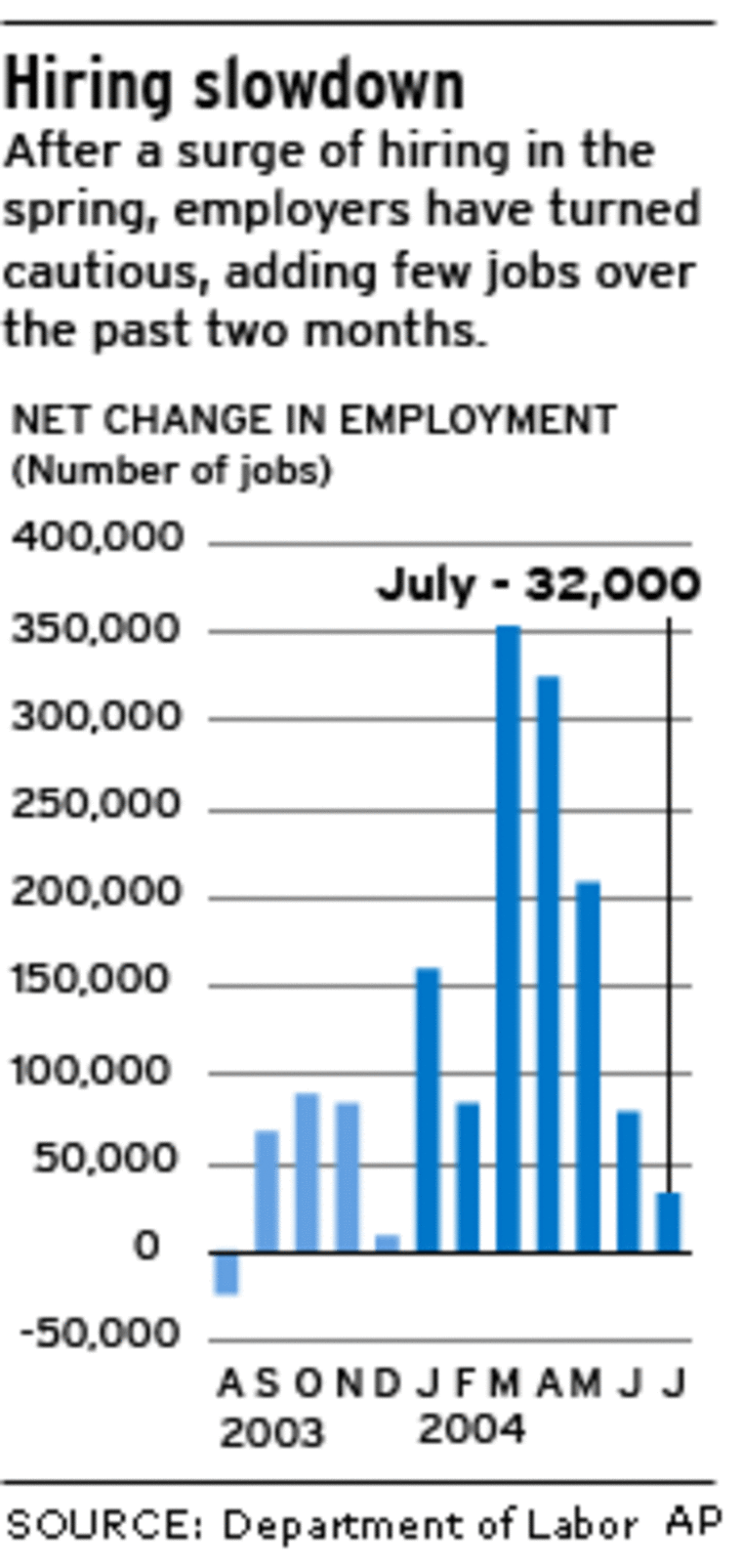In a report rich with implications for the presidential race and the future of interest rates, the government said Friday that the economy added only 32,000 jobs in July, a second straight month of weak hiring.
The unemployment rate paradoxically fell slightly from 5.6 to 5.5 percent, its lowest level since 2001, according to the Labor Department. But economists, investors and Federal Reserve policy-makers are more concerned with the monthly change in employment, which is considered a better gauge of the labor market’s health. Forecasters had predicted the economy would add between 200,000 and 300,000 jobs in July, according to Thomson Financial.
Stock prices fell to their lowest level of the year as investors were forced to confront the possibility that a so-called “soft patch” encountered by the economy could be more than a passing phase. A broad array of data show the economy is still growing steadily, but the unexpected lack of hiring injected a note of uncertainty into Fed Chairman Alan Greenspan’s plan to raise interest rates steadily from the current historically low levels.
Greenspan and his central bank colleagues still are widely expected to raise rates a notch Tuesday, but if hiring remains weak they might not raise rates again until after the November election, analysts said.
“Lets not get too carried away, but the economy is still struggling in this post-stimulus environment,” said David Rosenberg, chief North American economist at Merrill Lynch. He and other analysts said the economy has slowed sharply under an onslaught of higher market interest rates, sharply rising oil prices and the end of stimulus created by last year’s tax cuts.
In addition to the weak job growth in July, the Labor Department revised data from the previous two months, showing the economy added 61,000 fewer jobs than previously reported. Although the economy has added 1.2 million jobs this year, that is only slightly more than what is needed to keep up with growth in the nation’s work force. Employers would have to add another 1.2 million jobs by the end of the year just to get even with where the economy was before President Bush took office in January 2001.
“The President keeps saying we’ve turned the corner. But unfortunately, today’s job numbers further demonstrate that our economy may be taking a U-turn instead,” Democratic presidential nominee John Kerry said in a statement issued from Kansas City. President Bush tried to put the best possible face on the report, telling a New Hampshire audience, "Today’s employment report shows our economy is continuing to move forward." He added, however, that he would not be satisfied "until everybody who wants to work can find a job."
The weakness in July was due largely to a decline in service industries that have been the engine of recent growth, including financial services, retailing and restaurants and hotels. Manufacturing, which has struggled to come back from the shallow recession of 2001, added 10,000 jobs in the month.

The stock market, which has been pressured for months about uncertainty over the economy, the election and the potential for terrorism, fell to its lowest level of the year. The Dow Jones industrial average dropped 148 points, or 1.5 percent, to close at 9815, its lowest close since late November. The tech-heavy Nasdaq composite index lost 2.5 percent and is now down 11 percent for the year.
Federal Reserve Chairman Alan Greenspan, appearing before Congress last month, said that the economy hit a “soft patch” in June. But he expressed confidence that it would be short-lived.
Jobs an election issue
Bush and Kerry joust frequently over the health of the economy and the availability of jobs — prominent issues in the presidential campaign. Kerry says Bush’s economic policies aren’t working and squeeze the middle class. Bush insists his tax cuts have helped the economy rebound and that making those tax cuts permanent will spur more job creation. He’s counting on that to help him win another four-year term in November.
While the economic recovery is on a solid path, the labor market recovery has been spotty. Greenspan, in his appearance before Congress last month, noted that businesses have not completely abandoned their cautionary stance toward hiring.
Still, with the job situation uneven, Fed policy-makers have leeway to raise short-term interest rates gradually to head off any inflation problems, economists said. Central bankers meet next week and widely are expected to boost rates by a quarter-percentage point. On June 30, the Fed increased interest rates for the first time in four years, raising a key rate to 1.25 percent from a 46-year low of 1 percent.
In light of the latest employment report, though, the Fed may opt to order fewer rate increases this year than economists had previously anticipated, analysts said.
Even with the disappointing job growth in July, it still marked the 11th month in a row that the economy added jobs.
Separately Friday, consumer confidence surged in August to its highest level since the beginning of the year despite fresh terror threats and surging oil prices, according to an AP-Ipsos poll.